On Tuesday 16th July 2019, Canterbury Christ Church University held a free Library TeachMeet with the theme of Employability and information and digital literacies.
As a Learning and Research Librarian at CCCU, I have the specialism of employability which I explore in the context of our team’s work, developing students’ information and digital literacies. Something that is less explicit in our role is how we enhance student employability. Developing graduate attributes or professional skills are inescapable priorities within higher education and this led to my idea of organising a TeachMeet with the theme of employability.
From an institutional context, our colleagues in the Employability and Skills team have developed a framework which sees all elements of the university working to support their aims and embed employability. As a librarian, I felt that I needed to understand our role in the context of employability across the HE sector. What could be better than meeting librarians and learning developers who either currently embed employability within their teaching or have ideas about how this can be achieved? The purpose of the day was firstly, to share ideas and examples of our teaching practice and secondly, to inspire each of us to take away a concept and apply it to our own workplace. We were fortunate to have colleagues from a range of universities, each with different identities, cohorts and subject portfolios.
Keynote: David White, Head of Digital Learning, University for the Arts London (UAL).
“Avoiding the skills trap: Reflections on using the UAL Digital Creative Attributes to design teaching and learning.”
Link to David’s presentation slides.
David has lead numerous studies on the impact of the Web on learning and higher education. His best-known and most-used idea is a method of understanding individuals’ motivations to engage online: “Visitors and Residents.”
David spoke about the Digital Creative Attributes Framework (DCAF) which was developed specifically for the UAL institutional context. It uses language that relates to the creative disciplines and reflects practice rather than skills. The DCAF has been used with students in activities to see which areas of digital practice they understand, think are important and need support with. These activities included students rating the different practices according to whether they could be personally developed, learnt from friends, learnt through their course or via academic support. David explained their approach to working with academics to use the DCAF as a tool for designing learning and teaching. They encourage them to focus on seven or fewer DCAF practices that they want students to learn through an activity or unit. Academics can adapt and plan their learning designs by referring to other examples and the following guidelines:
- Practical (what you intend to do with the students)
- Sequential (plan in stages)
- Shareable (can it be used by your colleagues?)
20 minute talks:
Cheryl Coveney, Senior Library Manager (Academic Liaison, STEM, FBL), The Open University (OU).
“Mapping our Digital and Information Literacy Framework to the new Employability Framework and JISC Learner Profile.”
Link to Cheryl’s presentation slides.
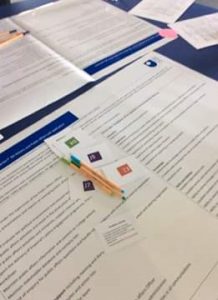
Cheryl talked about collaborating with Careers and Employability colleagues to embed employability with digital and information literacy in student study materials. She explained how, when presented with a new employability framework combined with the established Digital and Information Literacy (DIL) framework and JISC Learner Profile, the Learning and Teaching Librarians undertook the mammoth task of mapping and identifying where the language of digital and information literacy and identity overlap with employability. They created an infographic grid which shows where the two teams are duplicating work as well as areas ideal for collaboration. Cheryl also demonstrated a workshop activity for students whereby the language used in these frameworks and profile are matched with the language used by employers. She provided large posters of real job descriptions, pens, notes and framework skills cards. The activity encouraged us to think about how we would articulate our skills in relation to the requirements of a job. A point for reflection was how the language and concepts outlined on the cards, or in our own frameworks, compare with the language used in job descriptions.
Mike Alsford, Academic Skills Tutor, University of Greenwich.
“Digital Monsters.”
Link to Mike’s presentation slides.
Mike gave a thought-provoking talk about the importance of criticality when using technology. He spoke about the practice in education of testing out a tool without mapping to a final application, which can lead to unforeseen risks and raise questions over ethics. He emphasised the importance of interrogating our choices:
- Why should we adopt a particular digital tool?
- Who or what is the focus of the technology?
- How does it engage with its target?
Mike signposted the education technology strategy published by the Department of Education (2019) and highlighted a lack of reference to being critical when selecting digital tools. We often teach our students about the importance of critical evaluation and similarly, Mike recommends that we adopt the same approach regarding digital tools. The current focus on learning analytics was also touched upon by Mike’s example of interpreting data showing student library usage. Creating profiles of students does not replicate the complexities of actual students. We need to define our digital agenda and what our tools are designed to do.
Cathryn Peppard, Academic Services Librarian (Health), University of Greenwich.
“You’ve got a PAL in me: Mentorship and employability in a Peer Assisted Learning programme.”
Link to Cathryn’s presentation slides.
Cathryn spoke about a pilot project whereby four Peer Assisted Learning Leaders across two subject disciplines were recruited to support students. Cathryn and other members of the Academic Support team assisted with recruitment, mentoring and designing a two day training programme to share skills and develop both soft and academic capabilities. On reflection, she noted that the biggest achievement of the project was the development of the Leaders’ employability skills. They learnt how to respond to wellbeing issues while working with students and through their informal discussions with their mentors. They had to market the service, contact academics, and secure lecture time with first year students. Some academics were unwilling to allow them to present in lectures and so the Leaders needed to find creative approaches, e.g. giving flyers outside lectures. They also experienced the responsibilities of maintaining paperwork and working as part of a team. The use of reflective journals ensured Leaders had a place to record and reflect on the skills they were developing.
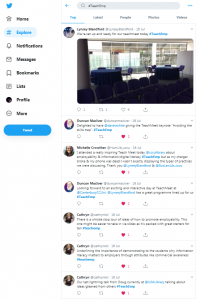
10 minute lightning talks:
Andy Prue, Subject Liaison Librarian, University of Kent.
“Helpful Tools for Employability.”
Link to Andy’s presentation slides.
Andy introduced a successful initiative to reach students and promote the use of online library resources to find additional information for job applications and interviews. The Careers and Employability Service hold a yearly Careers Fair which is open to students from all subjects and gives them the chance to meet exhibitors who offer opportunities for undergraduate and graduate students. After approaching the team, Andy secured 45 minutes to talk to the students attending the event about the ways the library can help when writing applications or preparing for interviews. He explained how to use the different databases by creating a case study of a particular company with a graduate scheme. The tools he focused on provide information on markets, trends and companies (e.g. Fame, Osiris, Mintel, etc.) and he illustrated how they can be used to develop and show commercial awareness. Another approach was to collate a reading list of careers books which made them discoverable via the university’s reading list system. Andy noted how after the event, usage statistics for the databases peaked.
Ian Badger, Learning & Teaching Librarian, University for the Creative Arts (UCA), Canterbury.
“Professional resources for practitioners.”
Link to Ian’s presentation slides.
Ian spoke about a recent project he has undertaken with the second year of the BA Graphic Design course at Canterbury. The course was revalidated in June 2018 with an emphasis on making the employability focus more obvious to students and to embed theory into practice. Traditionally students undertake practice-based modules in the studio and theory modules which involve essay writing. The change has seen theory embedded with shorter written assignments into practice, which works well for students who prefer practice and for the higher than average percentage of dyslexic students at UCA.
One assignment was a targeted industry report which was designed to encourage students to research and show commercial awareness of their sector. Ian analysed the suggested readings within the course handbook and they were concerned with employability in general. There was little information on where to research to gain current awareness in the profession. The impact of the lack of direction had shown in the previous year with students using uncredited images from Google and Instagram. Ian created a presentation and screencast for students to provide guidance as to what professional practice is and how to gain commercial awareness, for example through reading professional journals. Academics had expected students to look at wider reading and the latest developments in industry; however, as they were assignment-focused they had not strayed beyond the resources they already knew. The presentation was shown in seminars and the screencast was uploaded onto the students’ VLE. The screencast was accessed numerous times before the assignment deadline and it was shown that if resources are signposted students will use them.
Amy C Haworth, Service Development Manager, Learning Services, University of Sheffield.
“Commercial Awareness: a cross-department collaboration.”
Link to Amy’s presentation slides.
Amy explained how collaboration across the university can successfully create opportunities for students to develop their commercial awareness and also to recognise its value when applying for jobs and writing applications. The Library has an information and digital framework which recognises the value of these literacies as graduate attributes and transferable life skills. Their LibGuides also include sections on Information and Digital literacy for Employment, Researching employers and commercial awareness, and Information and Digital literacy at work. The guide features videos from the television programmes The Dragons den and The Apprentice where candidates who have poor commercial awareness are dismissed. There are also video and written testimonials from graduates about how information literacy has been useful in the workplace. Amy described a collaborative initiative between the Library, Careers service and Enterprise teams called ‘Join up your skills’. The scheme included workshops which demonstrated how to use business databases and shared details of open access resources to use after graduation. Amy reflected that currently they only reach students that access the Careers service but in the future they aim to share the message wider. A new Skills Forum with an institutional focus has been created to map who provides support and to find areas where teams can collaborate to embed employability across the institution at a programme level.
Doug Broadbent-Yale, Academic Librarian Social Science, University of East Anglia (UEA).
“Ideas from others: Employability in library teaching and learning.”
Link to Doug’s presentation slides.
Doug began by exploring the context of employability in Higher Education and at UEA. He stressed the impetus on ensuring all students, from practical and vocational as well as traditional academic subjects, have transferrable skills. Doug explained the service provided by Careers Central at UEA and also gave a snapshot of an employability week run by the Business School. It illustrated how much was on offer to students but also how this could be overwhelming. The Library contributed by offering workshops on useful databases (e.g. Mintel and Fame). Last year the library also invited representatives from the business databases to share with students the value of their resource.
Doug highlighted future initiatives to enhance student employability such as database certification for Westlaw, LexisLibrary and Justis One to benefit Law and Business Students. He also plans to collaborate with Careers Central on a ‘Living library’ idea whereby the books are people and students can have a 1-to-1 with them to learn more about their roles. The event can also be adapted for researchers, with their thesis as their book title which they explain to a non-specialist. Doug is considering collaborating on alumni events where students can meet graduates from different sectors and hosting a Digital skills week offering sessions such as an introduction to podcasting. He made a poignant observation that in all the roles and institutions he has worked, there had been no collaboration between the library and careers services. He stressed the importance of discovering what those working in libraries can learn from colleagues in careers.
Workshop and world café
Link to Rosie’s presentation slides.
The day concluded with a workshop led by Rosie Greenslade, Senior Academic Developer at CCCU, who encouraged attendees to reflect on the employability skills they already develop within their students when teaching or creating guides.
The session was followed by our version of a world café where in groups, we discussed and recorded solutions to the following questions which related to the themes of the day:
- What have you learnt today that you can use in your work?
- How could you collaborate with other teams or departments?
- How can we work with students to develop their digital capabilities?
- How can we develop research students’ employability?
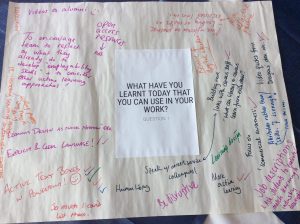
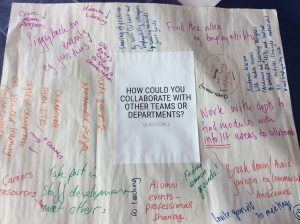
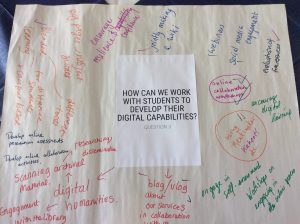
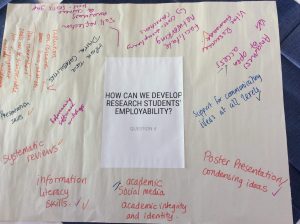
I would like to thank all of our speakers and attendees. The day was a great showcase of the current work in the sector and also provided space for us to reflect on our own practice and think of aspects that we would like to develop further.
Further reading
Department of Education (2019) Realising the potential of technology in education: A strategy for education providers and the technology industry. Available at: https://assets.publishing.service.gov.uk/government/uploads/system/uploads/attachment_data/file/791931/DfE-Education_Technology_Strategy.pdf (Accessed: 30 July 2019)
JISC (2017) Learner Profile. Available at: http://repository.jisc.ac.uk/6619/1/JiscProfile_Learner.pdf (Accessed: 30 July 2019)
The Open University (2019) Digital and Information Literacy Framework (DIL). Available at: http://www.open.ac.uk/libraryservices/subsites/dilframework/view_all (Accessed: 30 July 2019)
University of Sheffield (2019) Information and Digital literacy for Employment. Available at: https://sheffield.libguides.com/employabilityinfoliteracy (Accessed: 30 July 2019)
University of the Arts London (2019) Digital Creatives Attributes Framework: A staff guide to using the DCAF for teaching and learning. Available at: https://dcaf.myblog.arts.ac.uk/ (Accessed: 30 July 2019)
 Library
Library Lynsey Blandford
Lynsey Blandford 951
951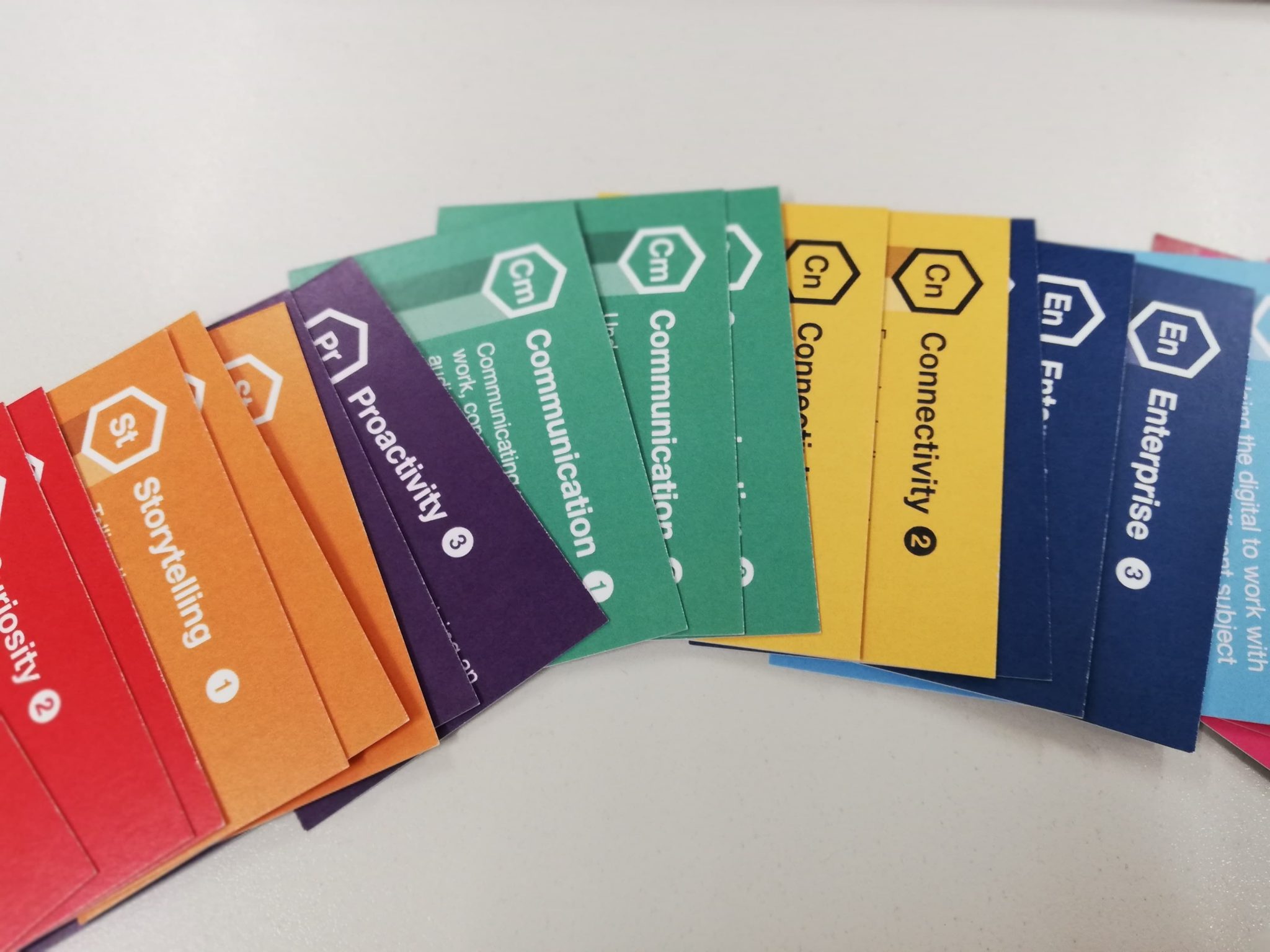



Comment on “Library TeachMeet: Employability and information and digital literacies”
Comments are closed.